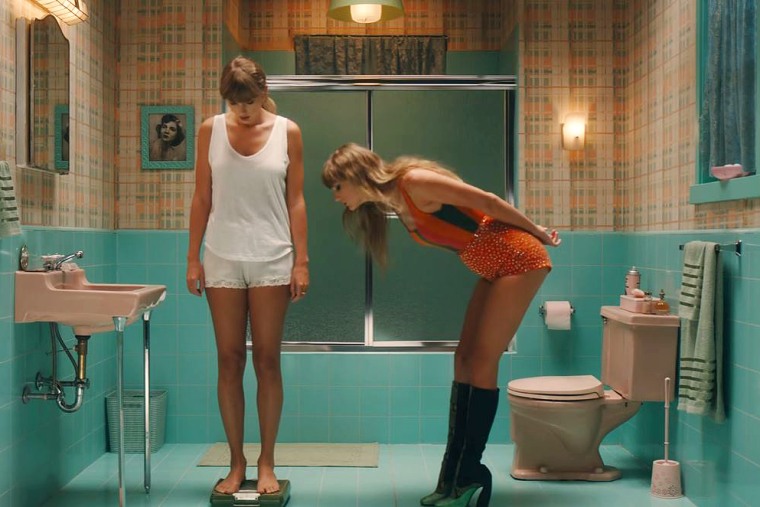Shortly after Taylor Swift released her music video for “Anti-Hero,” the lead single from her new album “Midnights,” she was criticized on social media for a visual that people deemed fatphobic. In the scene, Swift’s two selves (the real her and her “anti-hero” persona) are both in the bathroom when her real self stands on a scale. Her “anti-hero” character leans over to judge the number on the scale, but instead of numbers, a close-up shot reveals the word “FAT” — or it did. Earlier this week, Swift quietly removed this brief visual from the video on Apple Music and YouTube.
By showing the scale with “FAT” on it, Swift was boldly demonstrating the damage the rhetoric of valuing thinness and demonizing larger bodies has done to her
There are many offensive images and lyrics that artists put out today that deserve to be walked back, but this wasn’t one of them.
I still remember the moment I found out that Swift had an eating disorder. It was early 2020, and I was watching her Netflix documentary “Miss Americana.” I was shocked when she explained how she fell so far down the rabbit hole of body dysmorphia — where what you see about yourself doesn’t match the reality — she chose to starve herself.
Immediately, I broke down in tears. How could this woman whose art got me through my own body image struggles, who seemed unbreakable to me, become a victim of the same nasty and backward thought complex that I had for several years? It didn’t seem real.
That same openness was present in the now-deleted scene in “Anti-Hero.” And not only did it speak to her personal experience, it was also a commentary on the ridiculous standard of beauty that women of all generations are often held to.

When I saw that she had removed the clip that I found brave, I couldn’t help but feel upset. Why had Swift, once again, let criticism control her actions? Did she not stand by the critique she was making with this specific scene and the song and music video altogether?
By showing the scale with “FAT” on it, Swift was boldly demonstrating the damage the rhetoric of valuing thinness and demonizing larger bodies has done to her. It’s not an easy thing to unlearn. I am still unlearning it. Thousands of people across the gender spectrum are still unlearning it.
With the body positivity movement gaining traction, there has been progress in how women’s bodies in particular are perceived and discussed in the media and everyday life. But cultural observers have noted how this momentum could be waning as “the reemerging supremacy of thinness” is creeping back into the zeitgeist. Regardless of where society is in its perception of bodies, Swift’s experiences should be respected.
The singer has explained how it’s easier for her to deal with and map out her emotions through her art, mainly songwriting. “I’m not as articulate as I should be about this topic because there are so many people who could talk about it in a better way. But all I know is my own experience,” Swift told Variety in 2020.
And the thing is that the experiences she writes and sings about resonate with people and hold power to make someone who is struggling confront current or past issues.
For example, on “Midnights,” Swift sings as candidly as she ever has about her eating disorder in the song “You’re on Your Own, Kid.” When I heard the line “I hosted parties / And starved my body,” I couldn’t help but start to tear up as I remembered when I harmed my body in the same way. Similarly, when Swift visually depicted the illogical process of body dysmorphia in the “Anti-Hero” scale scene, it validated the difficulty I still have with weighing myself or even looking in the mirror.
This is not to say that I don’t understand how and why that moment in the video could have been triggering and insensitive. Using the word “fat” in a negative context can perpetuate the narrative that fatness is bad and can further stigmatize people with larger bodies. Swift may feel fat or perceive her body to be bigger than it actually is, but that does not mean she understands the complexities of the lived experience of a fat person. Although I do not think she was trying to make this claim, that does not mean people were not rightfully hurt by it.
But the issue is not about how people felt. It’s about Swift’s reaction to it. With this situation, she had an opportunity to engage in a dialogue about fatphobia and why it persists with fans and critics that may have misconstrued her artistic direction. She could have heard what her critics had to say instead of silently removing the clip. She also had a chance to discuss her body image issues further and explain her intended purpose with the scene. I’m sad she chose not to take it, especially considering her platform and impact.
Unfortunately, as Swift sings in her 2020 song “Peace,” she “never has the courage of her convictions.” It is a frustrating reality to contend with as a fan of hers. And she knows it, as she also sings, “it must be exhausting always rooting for the anti-hero” in “Anti-Hero.” It is, Taylor, it really is.
Source: | This article originally belongs to Nbcnews.com









